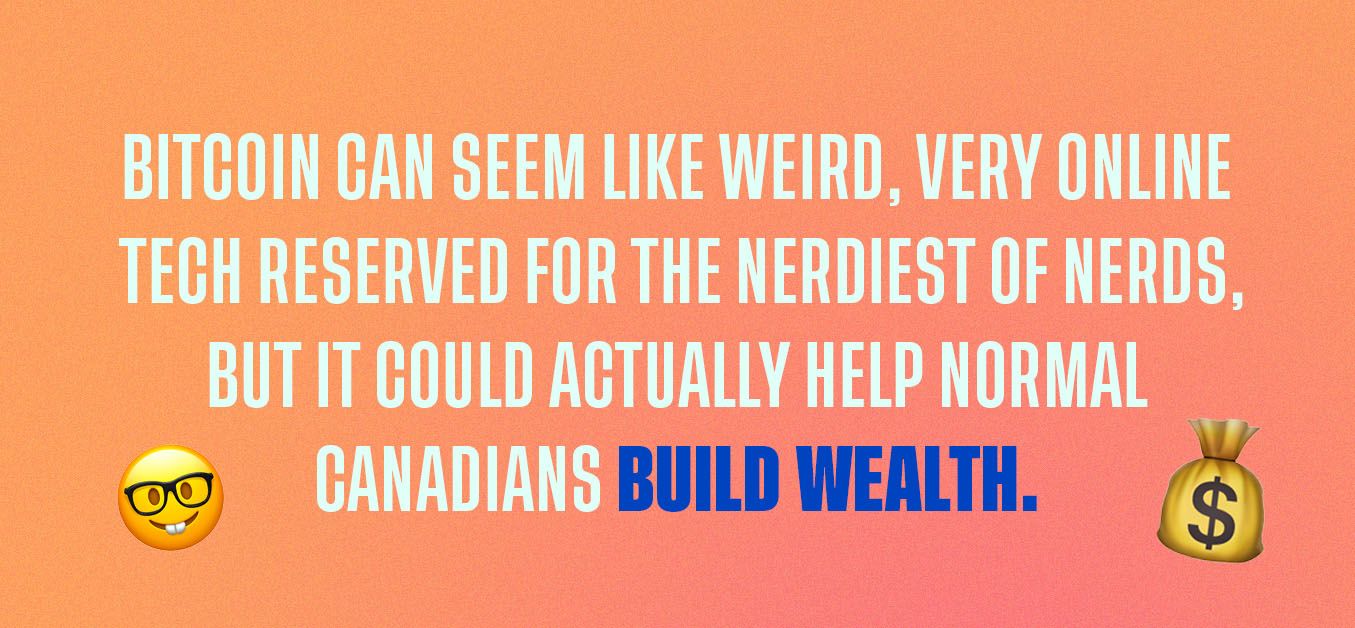A History of Bitcoin & Cryptocurrency
Where did Bitcoin and Cryptocurrency come from? Learn about the history of Bitcoin and its growing popularity here!
What is the history of bitcoin? This is an important question without a truly simple answer. But today in service of our short attention spans, let’s give it a go. (You may have read our earlier post that explained bitcoin and its origins in detail—if you’re into that, click here.)
Bitcoin was the first cryptocurrency to be invented. It was invented in 2009 by a person or group operating under the name Satoshi Nakamoto, and we still don’t know who this mysterious person or group is today. Bitcoin was first used in a transaction in 2010, when it was used to purchase pizza. #mood!
Over the last decade, bitcoin’s price has fluctuated wildly, including a crash in 2017, earning people lots of money and losing people lots of money. This year, bitcoin’s price reached an all time high of over $70,000 CAD per bitcoin.
This might seem like a bubble, but bitcoin has never before seen such a widespread mainstream uptake. Banks and moguls (read: Elon Musk) alike are embracing crypto and what it could mean for the future of our financial systems. So while bitcoin remains a very volatile asset, and not all crypto are created equally, we think the fundamental structures of crypto are here to stay.
What are Cryptocurrencies?
Cryptocurrencies are used in many of the same applications as fiat currencies, like the Canadian dollar. A fiat currency is a unit of value without any intrinsic value, and is modelled after the gold standard. Only instead of gold, the dollar is backed by the federal government.
But how does cryptocurrency work? To start, there’s no federal government or guarantor in sight.

In Canada, crypto is used differently than currency. Rather than transferring monetary value as you do when you pay for something, crypto transactions are considered bartering.
Got all that? Yes? But now, what is cryptocurrency, exactly? Crypto is a non-fungible token whose movement and ownership is recorded in the blockchain, which is a public ledger verified by members of the public. This means that every bitcoin is accounted for, and this helps mediate its scarcity and its value.
People like crypto because the blockchain is held publicly accountable, and because it isn’t linked to any government. But this means it can be very volatile.
What is Bitcoin?
Now, what is bitcoin? Bitcoin is one of dozens of cryptocurrencies available on the market, though it has demonstrated the most longevity and accumulated the most value. And we consider it to be a viable way for Canadians to build wealth.
Records* of trading and ownership are recorded against each specific coin. This concept is central to how bitcoin works. If records of bitcoin transactions didn’t exist for public oversight, well, bitcoins would be a lot like national currencies, and using them would be based on trust rather than proof.
How Bitcoin Began
Bitcoin was released in 2009 as an open source software created by Satoshi Nakamoto. It was accompanied by a short paper, entitled Bitcoin: A Peer-to-Peer Electronic Cash System. Who better to tell you about this than its creators?
Satoshi Nakamoto began their paper with this abstract:
“A purely peer-to-peer version of electronic cash would allow online payments to be sent directly from one party to another without going through a financial institution. Digital signatures provide part of the solution, but the main benefits are lost if a trusted third party is still required to prevent double-spending. We propose a solution to the double-spending problem using a peer-to-peer network. The network timestamps transactions by hashing them into an ongoing chain of hash-based proof-of-work, forming a record that cannot be changed without redoing the proof-of-work...”
And here’s how the keepers of bitcoin.org put it:
“Bitcoin is a consensus network that enables a new payment system and a completely digital money. It is the first decentralized peer-to-peer payment network that is powered by its users with no central authority or middlemen. From a user perspective, Bitcoin is pretty much like cash for the Internet. Bitcoin can also be seen as the most prominent triple entry bookkeeping system in existence.”
Bitcoin paved the way for other cryptocurrencies like Ethereum and Dogecoin, both of which are gaining steam in the market right now. This is largely due to this triple entry bookkeeping system, which refers to the blockchain. Without that public ledger, crypto couldn’t exist like it does today.
Bitcoin came from a humble and perhaps utopian idea, and has since come to change how we think of cash, currency, and wealth building in Canada today.
Bitcoin Today
Bitcoin today is a constant player on news hours, stock market watches, and Twitter alike. Whether it’s climbing (as it has been recently) or falling (which it is still likely to do at some point!), everyone’s talking about it.
Why? Because bitcoin is a revolutionary tech that is currently being integrated into the daily lives of millions of Canadians. How widespread is bitcoin? Elon Musk just outfitted Tesla to accept payment in it, for one. Twitter has adopted an emoji-fuelled language for crypto prices, namely, sending them sky-high on a meteoric rise like a rocket 🚀 headed straight for the moon 🌙 (hence, driving prices up is called “mooning.” Thanks for that, weirdos.).

Ahem, for example: on April 13, 2021, bitcoin peaked at almost $80,000CAD.
Do we think you should go out and invest your life savings? No no no no, please don’t do that. We can’t tell you what to do, but we’d never recommend that. Why? Bitcoin is volatile, and despite its months-long rally, you should be careful and never invest more than you can afford to lose.
This blog is provided for informational purposes only, is not intended as investment advice, and is not meant to suggest that a particular investment or strategy is suitable for any particular investor. If you’re unsure about an investment, you may wish to obtain advice from a qualified professional. Nothing herein should be considered an offer, solicitation of an offer, or advice to buy or sell securities. Buying and selling bitcoin is risky and you may suffer losses. The price of bitcoin is highly volatile and speculative and so you should never invest more in bitcoin than you can afford to lose. It’s also important to remember that past performance is no guarantee of future results.
*Trademark of Visa International Service Association and used under licence by Peoples Trust Company. Mogo Visa Platinum Prepaid Card is issued by Peoples Trust Company pursuant to licence by Visa Int. and is subject to Terms and Conditions, visit mogo.ca for full details. Your MogoCard balance is not insured by the Canada Deposit Insurance Corporation (CDIC). MogoCard means the Mogo Visa Platinum Prepaid Card.